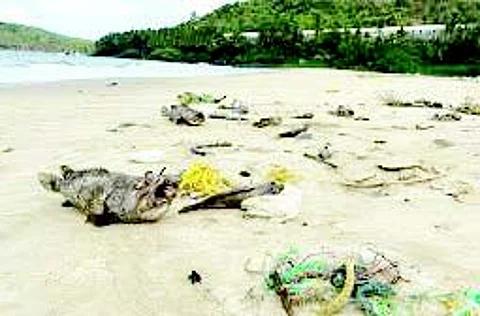

PANJIM: Based on prima facie evidence and after a thorough audit of the premises of Paradeep Phosphates, Zuarinagar, the Goa State Pollution Control Board (GSPCB) will serve a show cause notice to the factory for negligently storing fertiliser in its courtyard which got washed into the water bodies causing widespread death of fish in the Velsao bay and rivulet.
This was told to O Heraldo by the GSPCB chairman. He said that the Board officials carried out inspection of the premises of Paradeep Phosphates, the rivulet and Velsao bay on Sunday itself, given the gravity of the situation.
O Heraldo in its May 26 edition had reported widespread fish mortality in Velsao bay and the rivulet due to effluents being pumped into the water bodies.
Fishermen had alleged that the effluents were flowing from Paradeeep Phosphates, Zuarinagar.
GSPCB Chairman Mahesh Patil said, “We took samples of their surface drain, water from the rivulet and the Velsao bay and they have been given for analysis. We feel prima facie that whatever urea and fertiliser they are loading in the courtyard is getting washed away due to rain. That has caused the problem (of fish deaths).”
“We have observed that whatever material is lying in the courtyard and the railway loading point has been washed away due to the rains and that has caused the issue. So now we are giving them instructions and auditing the entire premises before the end of this week. Experts will audit the entire site. It will happen before this weekend,” Patil disclosed.
“We have also taken samples from the Velsao bay. We have seen everything and clicked photographs. Samples of dead fish have also been collected. Prima facie we have seen material lying around, the housekeeping was bad. The material was lying here and there and with the rain it has been washed down,” Patil elucidated.
More importantly, the Chairman of GSPCB underlined that “similar types of incidents have happened in the past”. “So it is a pure case of housekeeping negligence. We are doing a thorough audit of the entire factory. We have to complete the documentation and then we will serve the show cause notice,” Patil said.
Over the past few days, the bay as well as the brackish water rivulet known as Poiem at Dando, Velsao, have witnessed a significant number of dead fish.
The impact of this ecological disaster extends beyond just economic loss. Fresh fish, a local delicacy and a vital source of sustenance, is now in short supply, affecting not only the livelihoods of the fishing community, but also the large village population, particularly those from the OBC & ST communities.
The community elders lament that such environmental transgressions have become all too common in recent years.
Goenchea Ramponkarancho Ekvott (GRE) and Goencho Ekvott (GE), along with allied groups, had called for urgent action from the authorities. Agnelo Rodrigues, President of Goenchea Ramponkarancho Ekvott (GRE), had on Saturday stated, “Every year they release the effluents. When it rains, the effluents drain through the pipes into the rivulet and the sea. They have laid pipes for the effluents to seep into the sea, which has been taking place for many years and this has resulted in fish mortality.”
Goencho Ekvott writes to authorities in Velsao over fish deaths
MARGAO: Backed by the local fishermen, Goencho Ekvott (GE) has written to village authorities in Velsao, expressing grave concerns over large-scale fish mortality reported in the bay off Pale-Velsao and the Poie rivulet at Dando-Mollo.
The NGO has alleged that the mass deaths could be caused by the release of industrial effluents from the nearby Paradeep Phosphates Ltd. plant.
In a letter addressed to the Sarpanch and Secretary of the Velsao-Pale-Issorcim Village Panchayat, GE stated that they inspected the area along with the fishermen on Saturday, May 25, where they found a large number of dead fish, including rays, reef cod, eels, sole fish, and large crustaceans like mud crabs and sea crabs.
The letter, signed by GE founder Orville Dourado Rodrigues and chairman Cresson Antao, claims that these rich fishing grounds are not only a source of livelihood for the local OBC and ST communities but also serve as important breeding grounds for marine life, forming part of the region's well-documented village biodiversity.
GE has urged the authorities to seek immediate intervention from the Goa State Pollution Control Board (GSPCB) to investigate the cause of the fish mortality, which they suspect could be due to arsenic poisoning from the industrial plant's effluents.
The NGO has expressed concerns about potential irreversible damage to the local ecosystem if stringent action is not taken against violators of environmental norms.
“We request you to kindly seek the intervention of the GSPCB to immediately inspect the site, collect water, sand, and fish samples to investigate and determine the cause of the large-scale fish mortality,” the letter states.
Accompanying the letter are extracts from local news reports and audio-visual press coverage highlighting the incident, as well as photographs of the affected area.
The NGO’s letter also draws parallels with past incidents in the 1970s when the same industrial plant, then known as Zuari Agro Chemical Ltd., allegedly caused catastrophic environmental damage in the region.
Local fishermen and residents have long raised concerns about the industrial effluents’ impact on the marine ecosystem and their livelihoods. The authorities are yet to respond to the NGO's letter, but the matter has once again brought the issue of industrial pollution and its environmental consequences to the forefront.